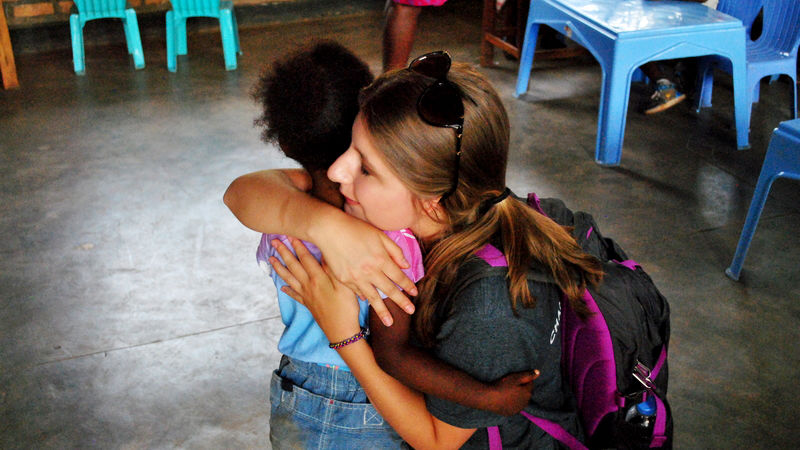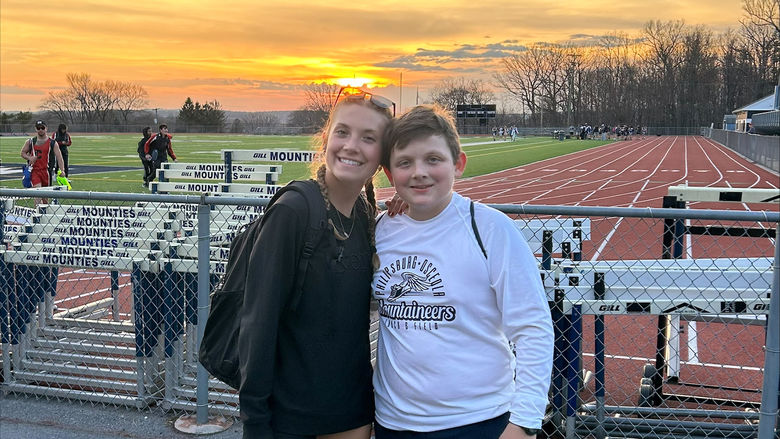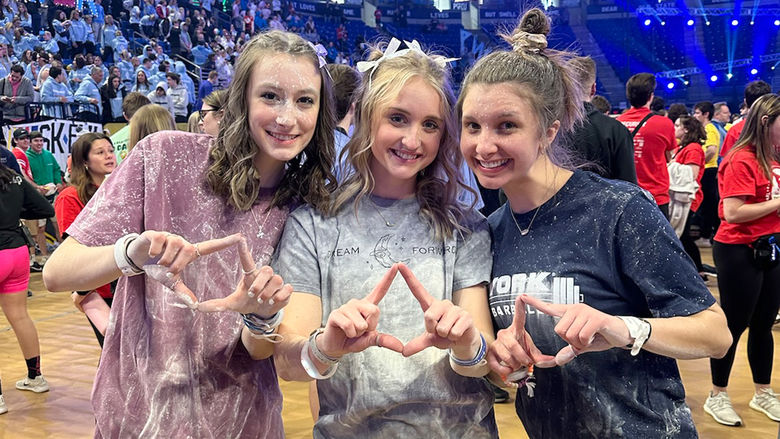

This dialog contains the full navigation menu for this site.

The Enactus team at Penn State Altoona is always on the go, immersed in projects locally and abroad. Through these projects, members of the organization hope to develop leadership, teamwork, and communication skills, but most importantly, they want to make a difference.
On an Enactus trip to Africa over the summer, one student was able to change the lives of four children. In turn, that impacted her own life beyond measure.
Penn State Altoona’s Enactus team has had an ongoing partnership with the Star School in the Masaka district outside of Kigali, Rwanda, for the last five years. As part of the “Beza Project” - Beza meaning ‘beautiful’ in the Kinyarwanda language - students have traveled to the school and built greenhouses, helped install a drip irrigation system, and facilitated the move from natural to artificial fertilizers used around the school. This year, the team tackled a biogas project, which converts raw materials like agricultural and municipal waste into a renewable energy source. The Star School currently relies on burning wood as a fuel source for cooking, spending over $350 a month with the average Rwandan making only $4 a day. By completing the biogas project, the school's dependence on wood as a fuel source will be greatly decreased, positively impacting the environment, as well as the school's budget. It will also bring the school into compliance with a new government mandate that requires schools across the country to use biogas.
The team was able to raise almost $8,000 over the last two years for the biogas system. Cynthia Wood, senior instructor in business administration and Enactus adviser, along with student Victoria Huscilowitc, flew to Rwanda for a week over the summer to visit the school. They did not have the skill set or expertise to actually do any of the biogas work themselves, but they still found ways to contribute to revitalization efforts. “Most people talk about minimizing your footprint, but when you do work in developing countries, you want to leave an impact. You want to say, ‘I've been here, this is the mark I left.’ I knew we weren't going to be able to roll up our sleeves and do any work with biogas, but the school needed some painting, so we had a private local donor give the necessary funds to purchase supplies, and Victoria and I painted the walls of the cafeteria in bright colors.” Wood says it’s a joy for her to see how the school has progressed over the course of their relationship, and she’s thrilled to be a part of its growth. “I am humbled and fortunate to be able to partner with them. They truly let us into their lives. That's part of the reason for going back all these years. By now, we’re family to them. They know we come back because we care about them, and they care about us.”
Wood emphasizes the importance of the collaboration that happens between Enactus and the school. Students are able to address opportunities and look for solutions together with school representatives. This gives students a global perspective and allows the team to offer ideas and resources both physical and financial that the school might not have access to. “It expands the school’s network of solutions and gives us experience in another country that we might not get otherwise. We all win when we engage in these global experiences.”
Huscilowitc is now at University Park studying corporation innovation and entrepreneurship. She had been to Africa with her family in 2014 on a trip to Kenya, but this was something altogether different, so she wasn’t sure what to expect. But in no time, she felt completely at home. “When we got to the Star School, the kids were just so excited to meet us. It was like I'd known them for ten years!” Huscilowitc spent time with the children playing Frisbee, something they’d never done before, and lots of time just hanging out with them. But what really got her attention was seeing the kids standing outside of the school, the ones who didn’t have the means to get inside the gate and enroll. “I was taking a tour of the nursery school area, and there was a girl outside the fence. She was 3 years old. She couldn't take her eyes off of the school, and there were tears in her eyes. I found out the girl’s older brother and sister both go to the school but her parents didn’t have enough money to send her, too. I thought to myself, ‘I'm going to change that.’" The next day, the little girl, Kiessa, came to school with her brother and tried out the classroom. Huscilowitc says the shy, timid child came alive right away. “As soon as she got in, she changed. She was laughing and talking to all of the other kids. She was walking around with the biggest smile on her face. I couldn't even tell you what that meant to me.” After she saw that, Huscilowitc signed Kiessa up immediately and paid the balance for the remainder of the year.
Huscilowitc was able to meet Kiessa’s mother, and although the language barrier didn’t allow them to converse much, it was a comfort just to be in each other’s presence and share a smile.
Huscilowitc called her own mother that night to tell her about Kiessa’s sponsorship. Her mother responded that she would sponsor a girl and a boy, to which Huscilowitc said she’d take on another boy to make things even. The next day, Huscilowitc asked the school’s principal for three more children. Two of them are 3 years old, the other is 8. “It hasn't been easy for most of these children. So many of them have one or both parents who are dead. It was a hard thing for me to experience, seeing how many kids are outside the gates, looking in, desperately wanting to learn.”
Huscilowitc knows that sponsorship can be a hard thing to do, and it is a long-term commitment paying for these children until they are 18, perhaps even beyond. “It was a very emotional experience. I definitely was letting my emotions carry me away a little bit. But I was also very aware and knew I had the power to get them to school, and so I did. If I can change the lives of these kids, starting at three and eight years old ... who are they going to be at 18? They could be president of the country. If that comes from me offering thousands of dollars, so be it.”
Wood was very proud of Huscilowitc. She was happy to watch her experience firsthand how people in other cultures live and flourish, and how partnerships can change lives. Wood says she tries to instill in her students the importance of investing in children’s education, at home or through alliances like the ones built with the Star School. She teaches that these alliances shape future leaders and that education is the key for children to succeed in their country and culture. “I thought it was cool that Victoria wanted to sponsor younger children whom she can watch progress. I think that showed that she wants to completely invest in these kids and their futures. Education is important and Victoria recognized that.”
Huscilowitc is excited to develop a deeper bond with all of her sponsored children through letters, cards, and progress reports. Meanwhile, she carries her adventures in Rwanda with her wherever she goes. “I am constantly thinking of Africa. I didn't think my experiences there would be in my everyday life this much. Sometimes just walking to class, I'm wondering what the kids are doing at the school and how things are going. I have a connection there now, and I definitely plan to go back.”


